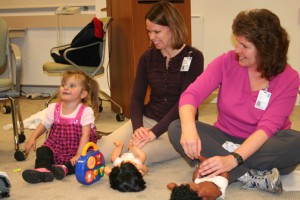Recreation therapist Laurie Sewell sits cross-legged on the floor of a UVA hospital conference room. She’s demonstrating infant massage techniques on a doll while 2-year-old Haley Poore watches her and plays with a colorful toddler toy.

Nearby, two parents quietly begin sharing their story: their 1-year-old son has pulmonary atresia, a condition that affects his heart’s ability to pump blood to the lungs. He had surgery a few months ago and is back in the hospital.
Lisa Curcio chimes in — her son, Owain, also has pulmonary atresia. He’s 3 now and running around the room with his brothers and sister, giggling.
This is a typical meeting of Mended Little Hearts of Charlottesville, where families affected by congenital heart defects (CHD) meet for dinner, support and education.
Some families, such as the Poores, come because their child is in the hospital, awaiting a transplant or other surgery. Haley has had two surgeries to manage her hypoplastic left heart syndrome and now needs a heart transplant. She and her family will live at the hospital until she gets it.
Other kids, such as Owain, are past their surgeries; their post-operation healing provides other families much-needed reassurance.
Congenital Heart Disease: The Most Common Birth Defect
“Throughout my pregnancies, no one told me heart defects were the number one birth defect.”
So says Lisa Curcio. She had a normal pregnancy, but several hours after Owain was born, she thought he looked blue. His pulse oxygen level was 40 percent by the time a doctor examined him; normal is between 95 and 100 percent.
Owain was rushed to UVA, where the Curcios learned he had pulmonary atresia and only one ventricle in his heart. A normal heart has two: one to pump blood to the lungs, the other to the rest of the body. Owain’s ventricle only pumped blood to his body, so his lungs weren’t getting any blood.
Even though there were no warning signs and the defect wasn’t preventable, Lisa Curcio still felt guilty. “I had three pregnancies (before Owain) and I was so blindsided by this.”
But congenital heart disease isn’t rare. According to the National Heart, Lung and Blood Institute, for every 1,000 babies born in the United States, eight have heart defects. In 2011, UVA’s pediatric heart surgeon, James Gangemi, MD, performed 210 surgeries to address congenital heart defects, 190 of which were on patients under 18.
Routine prenatal care sometimes catches a congenital heart defect; UVA also offers a fetal echocardiogram service for high-risk mothers that shows a detailed view of the fetus’ heart.
But many parents, like Lisa Curcio, are blindsided.
Support, Sometimes Far From Home
Mended Little Hearts is a national organization. Virginia’s other three chapters are in Lynchburg, Winchester and Richmond, and Washington, D.C., also has a chapter. The Charlottesville chapter meets at UVA and focuses on helping families of kids currently in the hospital, who frequently come from all over the state.
Haley Poore’s family, for example, is from Ewing, Va., 6 hours away.
Mended Little Hearts meetings offer a place for families to feel “totally safe, and everyone knows what they’re going through,” says UVA RN Carol Tatum, who works with pediatric heart patients.
Meetings are monthly and include dinner and childcare so siblings can come. While they have a topic, such as the infant massage demonstration, they’re informal and give parents a chance to share stories and talk.
Besides the meetings, Mended Little Hearts does other social events and projects to help families in the hospital. Lisa Wickersty, whose daughter Isla was born with Tetralogy of Fallot, received a grant to order heart pillows for kids in the hospital. The kids like to hug them; the parents get the other families and staff they meet in the hospital to sign them.
“Not a Death Sentence”
Isla had surgery at six weeks old to close the hole in her heart and help blood get to her lungs. She has an annual check-up to monitor her heart but is a healthy 3-year-old with no activity restrictions.
As for Owain, he’s had three staged surgeries to help his blood circulate in a more normal fashion: a Blalock-Taussig (BT) shunt placement, the Glenn procedure and the Fontan procedure. The ultimate goal was to get blood from his heart to his lungs for oxygen and then supply the rest of his body with oxygenated blood.
Doctors expect Owain to live a normal life without more surgeries, but his mom is blunt: His heart is “patched together,” not normal, and something could always go wrong.
While being prepared for the worst, she hopes for the best. She tells parents of newly diagnosed children, “It doesn’t have to be a death sentence. It doesn’t have to be a death sentence at all.”
Do You Have a Child With Heart Disease?
Mended Little Hearts of Charlottesville meets the second Monday of each month, from 4:00-5:30 p.m. in UVA’s NICU conference room.
You can also connect with them through their:
And learn more about UVA’s Fetal Heart Program.
Not in Charlottesville? Visit the national Mended Little Hearts website to find a chapter near you.
There’s also a new chapter forming in Roanoke. For more information or to volunteer as part of the leadership team, contact Lisa Curcio.
Is congenital heart disease in your family? Share your story by leaving a comment.